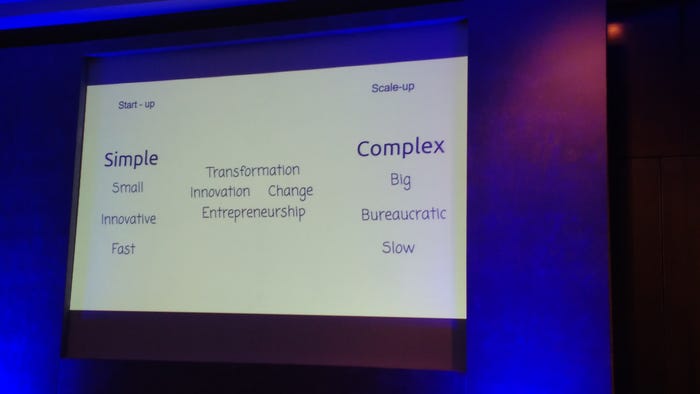Google has a crack at defining digital transformation
Digital transformation is a buzzword that entrenched itself in the tech and business worlds, but who actually knows what it means? Google’s Yuval Dvir had a go at pinning down a definition.
September 27, 2016

Digital transformation is a buzzword that entrenched itself in the tech and business worlds, but who actually knows what it means? Google’s Yuval Dvir had a go at pinning down a definition.
According to Dvir, who was speaking at the Managed Services World Congress, the key to digital transformation is change. Now this may seem pretty bloody obvious, but in fact it seems that corporate decision makers the world over are vastly under-estimating the scale of change. This could mean change in the context of technology where data is becoming the digital currency, in the context of people who are becoming more immersed in the virtual world, or in the context of business where the cloud has increased the frequency of innovation.
Change is the driver and the result, but from Google’s perspective the root and definition of digital transformation is embracing and incorporating intelligence into every aspect of the business. This does not mean employees will be replaced by machines in a violent revolution, but through the implementation of machine learning and advanced data analytics (for example) processes, decisions and products can be enhanced as more information and insight will be available.
This is not just a theory however, this has been put into practise by the Google execs and the successes of the project are beginning to make inroads into our daily lives.
British-born Deepmind was founded in 2010, and brought into the Google family in 2014 for an impressive $500 million. The Deepmind team have been recognized as some of the leading figures in the world regarding artificial intelligence, in particular advanced analytics, data driven decision making and machine learning. Through the acquisition of Deepmind, Google pushed itself to the forefront of the artificial intelligence subsector, and in turn to the front of one of the next industrial revolutions.
But what does this mean to the concept of digital transformation? According to Dvir, it means everything.
 Digital transformation is the process of building an organization which is capable of competing in the connected world. It means large, complex and traditional organizations have to adapt their models to enable competition with smaller, nimble and agile start-ups who are driven by the power of cloud computing. This can only be done through the implementation of processes and technologies which enable automation, flexibility and adaptability. This means building intelligence into products, processes and business models.
Digital transformation is the process of building an organization which is capable of competing in the connected world. It means large, complex and traditional organizations have to adapt their models to enable competition with smaller, nimble and agile start-ups who are driven by the power of cloud computing. This can only be done through the implementation of processes and technologies which enable automation, flexibility and adaptability. This means building intelligence into products, processes and business models.
For Google’s own transformation projects, Deepmind is the central technology which enables the organization to compete. For every advancement made in the field of artificial intelligence, the lessons and intelligence is built outwards into the customer-facing Google products.
Google is one of the world leaders in the field of artificial intelligence, so it’s always going to say intelligence and insight is the cornerstone to any successful digital transformation strategy. However, it is one of the few companies which has put its hand up and put forward a relatively simple explanation of what digital transformation means, so fair cop to them.
This is a specific example to Google but the lessons can be applied elsewhere. In this example, digital transformation means implementing new technologies which make your business more intelligent and automated, capable of operating in the connected world and engaging the digitally driven consumer.
About the Author
You May Also Like


.png?width=300&auto=webp&quality=80&disable=upscale)







.png?width=300&auto=webp&quality=80&disable=upscale)


_1.jpg?width=300&auto=webp&quality=80&disable=upscale)